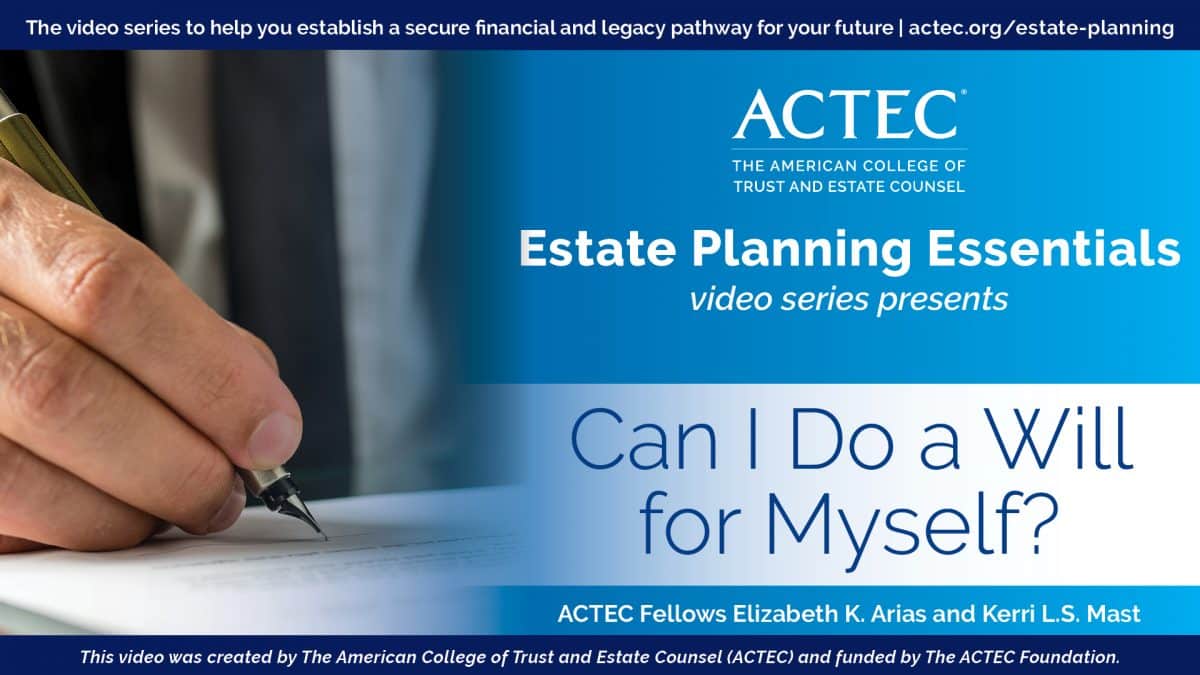What is a fiduciary, agent, executor, trustee, or guardian? These people have critical roles in an estate plan, and it’s essential to understand who you might need to hire and the jobs you can give to a trusted family member or friend.
In this video, ACTEC Fellows Emily Kembell and Natalie Perry explain the responsibilities of each role, their importance to the planning documents, and the traits you should be looking for as you select your estate management team.
Transcript
I’m Natalie Perry, ACTEC Fellow from Chicago, Illinois and I’m here today with Emily Kembell, ACTEC Fellow from Springfield, Missouri. Emily, thanks for being here. We’re going to talk today about the roles involved in an estate plan. Emily, could you tell us about the different roles? Let’s start with an executor and trustee. And I know we were talking before we started filming about a fiduciary and how these are fiduciary roles. Could you explain a little bit about what that means as well?
Absolutely. Thank you for having me, Natalie. So, a fiduciary is someone or a company who was charged with having a duty to act in the best interest of someone else; and so, they are held to a higher standard than someone acting on their own behalf. Because of that, if they don’t meet that standard and they breach their fiduciary duties, they can be held accountable for that in court.
Thanks, Emily. Can you tell us also, what is a guardian? What role does that person play and where are they named?
Sure. A guardian is a very important role and that’s the individual that you name in your last will and testament, and that’s the individual who is charged with taking care of any minor or disabled children that you might have at the time of your death. And so, they would petition the court for letters of guardianship, and they would be appointed in that role and be able to make decisions like what doctor the child should go to or what school they should go to; things that are about the care of your child.
Okay, that’s helpful. So, I know there are also people named in a Power of Attorney. I think they’re called agents, or it might depend on what state you’re in. Tell us more about that role. And maybe you could also touch on do these people get paid because it seems like these are big responsibilities we’re talking about.
Absolutely. So, agents, often they’re called Attorneys-in-Fact, are fiduciaries that are named in Durable Powers of Attorney documents. And you can have durable Powers of Attorney for legal and financial decisions, and you can also have Durable Powers of Attorney for healthcare decisions. And those agents that you designate in those documents have the ability to make decisions for you during periods of incapacity. And the durable Powers of Attorney documents die with you. So, these agents no longer have authority following your death, but they do have a lot of authority in your lifetime, and you can name different individuals to make types of decisions.
So, for example, you might want to name someone for healthcare decisions and someone else for legal and financial decisions. These roles do allow for compensation to be paid to the fiduciary. And that’s true for some of the fiduciary roles as well, but if you name an individual for these roles, it’s often just what we refer to as reasonable compensation. It’s not necessarily specifically set forth in the document, but they do have the ability to charge some kind of a fee if they choose to do so.
Okay, great. And maybe before we wrap up, I know this is a big question, but could you touch on what should someone think about when they’re naming these roles?
That is a big question. Sometimes it’s ability. So, there’s a lot to serving in these roles, managing assets, being organized, responsible, and understanding the wishes of what the client would have wanted. But a lot of times, it’s also just knowing what you don’t know and having the ability to know you need to hire experts to advise you in your role, whether that’s tax advisors, investment advisors, or attorneys, to help advise you how to act as a fiduciary to accomplish the goals in your job description.
That’s a good point. Okay. Well, I think that’s all we have for today. Thank you, Emily, for teaching us more about the roles in an estate plan.
Thanks, Natalie.
Featured Video
Can I Do a Will for Myself?
Understand the pros and cons of writing a will for yourself and what should be considered when planning for the disposition of your assets.
ACTEC Estate Planning Essentials

ACTEC Fellows provide answers to frequently asked trust and estate planning questions in this video series.



